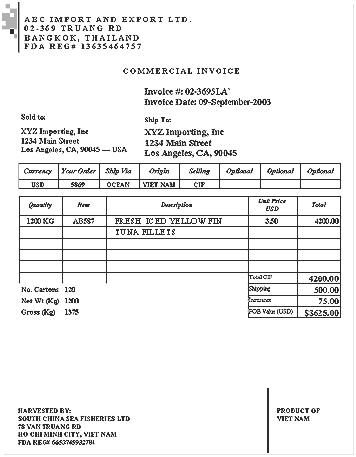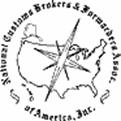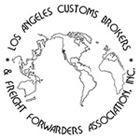BIOTERRORISM ACT AND PRIOR NOTICE FOR FOOD AND FOOD PRODUCTS
The events of September 11, 2001, reinforced the need to enhance the security of the United States, and Congress responded by passing the Public Health Security and Bioterrorism Preparedness and Response Act of 2002 (the Bioterrorism Act) that President Bush signed into law June 12, 2002.
Under this law prior notice of all imported foods and beverages, whether or not intended for human consumption, must be received and confirmed electronically by FDA no more than five days before its arrival and no fewer than:
- Two hours before arrival by land via road
- Four hours before arrival by air or by land via rail
- Eight hours before arrival by water

Up until now U.S. Customs and Border Protection (CBP), the agency in charge of enforcement, has been lenient, focusing more on education rather than confiscation and imposition of fines. The law has been going into effect in phases with the first two focusing primarily on outreach, education, and correctional letters. This is changing with the start of the third phase of the program which requires CBP to begin enforcing the requirements on November 7, 2004. Through each of the phases, Customs and FDA is looking at what you do and do not do; are you a repeat offender or someone that made a mistake? In the third phase, CBP will consider culpability to determine the appropriate enforcement action.
Failure to alert the FDA in a timely manner will result in the food being denied entry until errors are corrected. No more letters, no more warnings; starting November 7, 2004, if you ship food or food products to the U.S. you had better be following the rules outlined in the Bioterrorism Preparedness and Response Act of 2002 (Bioterrorism Act of 2002) or your goods could be refused entry. You may also have to pay a penalty. And, unless you qualify for the farm exemption, all firms in the U.S. and abroad that manufacture, process, pack or hold food for human or animal consumption in the U.S. must be registered with the Food and Drug Administration (FDA).
November 7, 2004 is the date importers need to make sure they are fully compliant. If you are a food importer and you fail to file prior notice, make a mistake, or if your notice does not reach FDA on time, Customs will have the option to seize your goods and/or assess a fine and the final determination will rest with the Customs agent.
The following paragraphs are excerpted from FDA's Compliance Policy Guide - the manual agents refer to for guidance on enforcement:
"We intend to reject prior notice submissions unless the prior notice includes a valid registration number or an appropriate reason code selected from among those provided in the Prior Notice System Interface (PNSI) and the Automated Broker Interface of the Automated Commercial System (ABI/ACS) (see Appendix 1). Rejected submissions are not confirmed for FDA review."
"In general, for any prior notice violation, the action FDA and CBP staff typically should consider taking is refusal and/or assessment of CBP Civil Monetary Penalties."
Our suggestion is to keep an eye on the Bioterrorism Act section of FDA's website, http://www.cfsan.fda.gov/~pn/cpgpn2.html, for updates and changes. The link will take you to a document called Compliance Policy Guide/Guidance for FDA and CBP Staff/Prior Notice of Imported Food and gives you precise detail on what you're supposed to do and explains the culpability levels.



Important Links